Fleurs du Mal Magazine


Or see the index
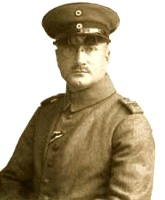
Schwermut
Schreiten Streben
Leben sehnt
Schauern Stehen
Blicke suchen
Sterben wächst
Das Kommen
Schreit!
Tief
Stummen
Wir.
August Stramm
(1874-1915)
Schwermut, 1914
• fleursdumal.nl magazine
More in: *War Poetry Archive, Archive S-T, Expressionism, Stramm, August
In this innovative study, Tyler Whitney demonstrates how a transformation and militarization of the civilian soundscape in the late nineteenth and early twentieth centuries left indelible traces on the literature that defined the period.
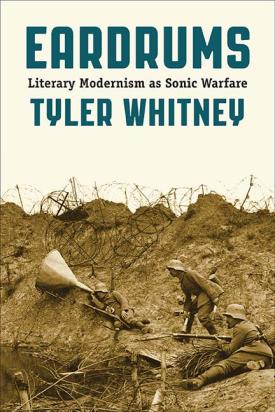 Both formally and thematically, the modernist aesthetics of Franz Kafka, Robert Musil, Detlev von Liliencron, and Peter Altenberg drew on this blurring of martial and civilian soundscapes in traumatic and performative repetitions of war.
Both formally and thematically, the modernist aesthetics of Franz Kafka, Robert Musil, Detlev von Liliencron, and Peter Altenberg drew on this blurring of martial and civilian soundscapes in traumatic and performative repetitions of war.
At the same time, Richard Huelsenbeck assaulted audiences in Zurich with his “sound poems,” which combined references to World War I, colonialism, and violent encounters in urban spaces with nonsensical utterances and linguistic detritus—all accompanied by the relentless beating of a drum on the stage of the Cabaret Voltaire.
Eardrums is the first book-length study to explore the relationship between acoustical modernity and German modernism, charting a literary and cultural history written in and around the eardrum. The result is not only a new way of understanding the sonic impulses behind key literary texts from the period. It also outlines an entirely new approach to the study of literature as as the interaction of text and sonic practice, voice and noise, which will be of interest to scholars across literary studies, media theory, sound studies, and the history of science.
Tyler Whitney is an assistant professor of German at the University of Michigan.
Tyler Whitney (Author)
Eardrums.
Literary Modernism as Sonic Warfare
Cloth Text – $99.95
ISBN 978-0-8101-4022-6
Paper Text – $34.95
ISBN 978-0-8101-4021-9
Northwestern University Press
Publication Date June 2019
Literary Criticism
232 pages
Price: $24.00
# new books
Tyler Whitney
Eardrums.
Literary Modernism as Sonic Warfare
• fleursdumal.nl magazine
More in: # Music Archive, #Archive A-Z Sound Poetry, *War Poetry Archive, - Book News, - Book Stories, Archive W-X, AUDIO, CINEMA, RADIO & TV, DADA, Dadaïsme, Kafka, Franz, Modernisme, Visual & Concrete Poetry
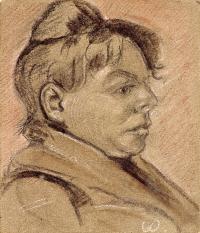
Meer, meer!
Verwond, vermink,
Schiet dood, houw neer!
Roep legers op.
Steeds meer, steeds weer.
Vermorzel ze
Hak z’in elkaar!
Bedenk, het is
uw broeder maar.
Spreek ik zoo goed?
Is ‘t mooi zoo’n lied?..
De mensch sterft uit,
maar ‘t hindert niet!
Agnita Feis
(1881 – 1944)
Uit: Oorlog. Verzen in Staccato (1916).
Meer, meer!
• fleursdumal.nl magazine
More in: *War Poetry Archive, Agnita Feis, Antony Kok, Archive E-F, Feis, Agnita, Theo van Doesburg (I.K. Bonset), WAR & PEACE
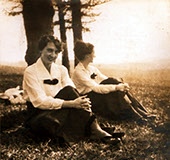
Choice
Imperious Time, I must prefer
Thy just necessity:
Resign the silent, earlier
Beliefs grown dear to me.
The stillness left alternatives
To youth, a freedom wide
And dim as dreaming, but man lives,
And must one day decide.
There is a doom the years compel:
I must approach the goal
Decreed, where it behooves me dwell:
I must declare my soul;
Must speak and choose what stars pertain
To me ; needs must I rest
In their most intimate beams, remain
Committed and confessed.
I claim a tent of stars in place
Of heaven’s confusing dome:
A tent of stars in a dark space —
The sky must be my home.
Gladys Cromwell
(1885-1919)
Choice
From: Poems 1919
• fleursdumal.nl magazine
More in: Archive G-H, Cromwell, Gladys, Gladys Cromwell

Nacht im Schützengraben
Tief will sich der Himmel neigen,
Schwer von seiner Sternenlast.
Runde Leuchtraketen steigen
Auf zu seinem Blaudamast.
Rückwärts ist mein Kopf geglitten
Auf den Sand der Schulterwehr
Und mir ist, als wär ich mitten
In dem weißen Silbermeer.
Schüsse fallen, Rufe kommen,
Meine Hand kühlt kühlen Wind,
Und ich weiß kaum, traumbenommen,
Noch, was Stern, was Augen sind.
Gerhard Moerner
(1894-1917)
Aus: „Aus dem Felde“. Gedichte.
Kugelverlag, Hamburg 1917.
• fleursdumal.nl magazine
More in: *War Poetry Archive, - Archive Tombeau de la jeunesse, Archive M-N, WAR & PEACE
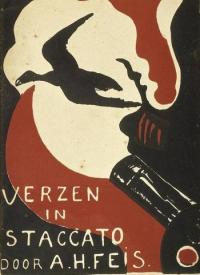
De Soldaat.
Geen mensch.
Geen dier.
Geen plant:
Een ding.
Het mort
noch klaagt:
Zijn kracht
verging.
Het lijdt.
Het sjouwt.
Het torst
gewicht.
Geen vreugd.
Geen lach
op zijn
gezicht.
Vraag.
O mensch,
mijn vriend,
waar gaat
dat heen?
Antwoord.
Het vuur,
de dood,
‘t Is mij
heusch één!
Agnita Feis
(1881 – 1944)
Uit: Oorlog. Verzen in Staccato (1916).
De Soldaat
• fleursdumal.nl magazine
More in: *Concrete + Visual Poetry F-J, *War Poetry Archive, Agnita Feis, Antony Kok, Archive E-F, Archive E-F, DADA, De Stijl, Feis, Agnita, Theo van Doesburg (I.K. Bonset)
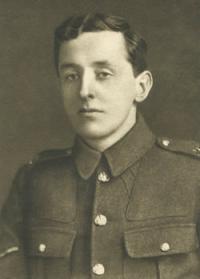
Shelley in the Trenches 2nd May 1916
Impressions are like winds; you feel their cool
Swift kiss upon the brow, yet know not where
They sprang to birth: so like a pool
Rippled by winds from out their forest lair
My soul was stir’d to life; its twilight fled;
There passed across its solitude a dream
That wing’d with supreme ecstasy did seem;
That gave the kiss of life to long-lost dead.
A lark trill’d in the blue: and suddenly
Upon the wings of his immortal ode
My soul rushed singing to the ether sky
And found in visions, dreams, its real abode –
I fled with Shelly, with the lark afar,
Unto the realms where the eternal are.
John William (Will) Streets
(1886 –1916)
Shelley in the Trenches 2nd May 1916
• fleursdumal.nl magazine
More in: - Archive Tombeau de la jeunesse, Archive S-T, Shelley, Percy Byssche, Streets, Will, WAR & PEACE

The Beggar
Showing his ill-made frame
And mumbling of troubles many,
Along a public street,
The cripple calls for a penny.
Inviting sympathy,
By his rags and his withered arm,
He follows and frets till we argue
A penny can do him no harm.
Just now, in this intimate room,
Sagacious, clever and witty,
Exposing his hardships, a Beggar
Beckoned his friends for pity.
Ugh! By displaying his pains,
By showing his heart was ashen,
By revealing his twisted life,
He played for a glance of compassion.
Strange how I longed to laugh ;
His feebleness was funny.
I thought : ” He’s only a Beggar
And affection is golden money.
Gladys Cromwell
(1885-1919)
The Beggar
From: Poems 1919
• fleursdumal.nl magazine
More in: Archive C-D, Cromwell, Gladys, Gladys Cromwell, WAR & PEACE

Oorlog!
Een volk.
Een land:
Het bloeit.
Het geurt.
Eén graf!
Eén brand!
Men rouwt.
Men treurt.
Agnita Feis
(1881 – 1944)
Uit: Oorlog. Verzen in Staccato (1916).
Oorlog
• fleursdumal.nl magazine
More in: *War Poetry Archive, Agnita Feis, Archive E-F, DADA, De Stijl, Doesburg, Theo van, Feis, Agnita, WAR & PEACE
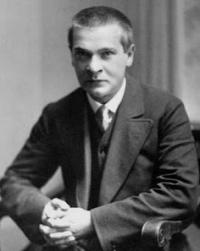
An die Melancholie
Immer wieder kehrst du Melancholie,
O Sanftmut der einsamen Seele.
Zu Ende glüht ein goldner Tag.
Demutsvoll beugt sich dem Schmerz der Geduldige,
Tönend von Wohllaut und weichem Wahnsinn.
Siehe! es dämmert schon.
Wiederkehrt die Nacht und klagt ein Sterbliches
Und es leidet ein anderes mit.
Schaudernd unter herbstlichen Sternen
Neigt sich jährlich tiefer das Haupt.
Georg Trakl
(1887 – 1914)
An die Melancholie, 1913
• fleursdumal.nl magazine
More in: Archive S-T, Trakl, Georg, Trakl, Georg
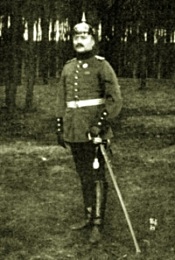
Schön
Wissen Tören
Wahr und Trügen
Mord Gebären
Sterben Sein
Weinen Jubeln
Haß Vergehen
Stark und Schwach
Unmöglich
Kann!
Dein Körper flammt!
Die Welt
Erlischt!
August Stramm
(1874-1915)
Schön, 1914
• fleursdumal.nl magazine
More in: *War Poetry Archive, Archive S-T, Expressionism, Stramm, August

The Gates of Utterance
There is a throng within the gates,
A pressing, diverse throng;
Without, a peaceful throng awaits,
To which I would belong.
Within the gates the varied folk
Advise discordantly;
Without, the poet-crowds convoke
To council harmony.
Within the gates are all the heights
And depths of serried powers;
But when a lyric theme invites,
I reach out-lying bowers
Where dwell the bards of quiet years ;
I join my song to theirs;
My glad, unfettered spirit hears
The melody it shares.
Gladys Cromwell
(1885-1919)
The Gates of Utterance
From: Songs of the Dust, 1915
• fleursdumal.nl magazine
More in: Archive C-D, Archive C-D, Cromwell, Gladys, Gladys Cromwell
Thank you for reading Fleurs du Mal - magazine for art & literature